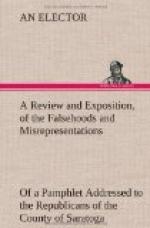The hate of England pursued them here and those who dared to give help and shelter. The United States were opening wide their arms to receive the stream of Irish fugitives and were saying very harsh things of England’s infamous rule in Ireland. This could not be brooked. England in those days had not invented the Anglo-Saxon theory of mankind, and a united Germany had not then been born to vex the ineptitude of her statesmen or to profit from the shortcomings of her tradesmen.
So the greatest Ministers of Queen Victoria seriously contemplated war with America and naturally looked around for some one else to do the fighting. The Duke of Wellington hoped that France might be played on, just as in a later day a later Minister seeks to play France in a similar role against a later adversary.[3]
[Footnote 3: Sir Edward Grey and the Entente Cordiale.]
The Mexicans, too, might be induced to invade the Texan frontier. But a greater infamy than this was seriously planned. Again it is an Irishman who tells the story and shows us how dearly the English loved their trans-Atlantic “kinsmen” when there was no German menace to threaten nearer home.
Writing from Carlsruhe, on January 26th, 1846, to his friend, Alexander Spencer, in Dublin, Charles Lever said: “As to the war the Duke[4] says he could smash the Yankees, and ought to do so while France in her present humour and Mexico opens the road to invasion from the South—not to speak of the terrible threat that Napier uttered, that with two regiments of infantry and a field battery he’d raise the slave population in the United States.”
[Footnote 4: The Duke of Wellington: the report was brought to Lever by the Marquis of Douro, the Duke’s heir.]
The infamy of this suggestion cannot be surpassed. The brilliant soldier who conceived it was the chivalrous Englishman who conquered Scinde, one of the chief glories of the Britannic hierarchy of soldier-saints.
The Government planning it was that of the late Queen Victoria with the Duke of Wellington’s advice, and the people against whom the black-slave millions were to be loosed were the “kith and kin” of those meditating this atrocious form of massacre. Truly, as an old Irish proverb, old even in the days of Henry VIII. put it, “the pride of France, the treason of England and the warre of Ireland shall never have end.”
As a latter day witness of that treason, one who had suffered it from birth to the prison cell, a dead Irishman speaks to us from the grave. Michael Davitt in a letter to Morrison Davidson on August 2701, 1902, thus summed up in final words what every Irishman feels in his heart:
“The idea of being ruled by Englishmen is to me the chief agony of existence. They are a nation without faith, truth or conscience enveloped in a panoplied pharisaism and an incurable hypocrisy. Their moral appetite is fed on falsehood. They profess Christianity and believe only in Mammon. They talk of liberty while ruling India and Ireland against the principles of a constitution, professed as a political faith, but prostituted to the interests of class and landlord rule.”




